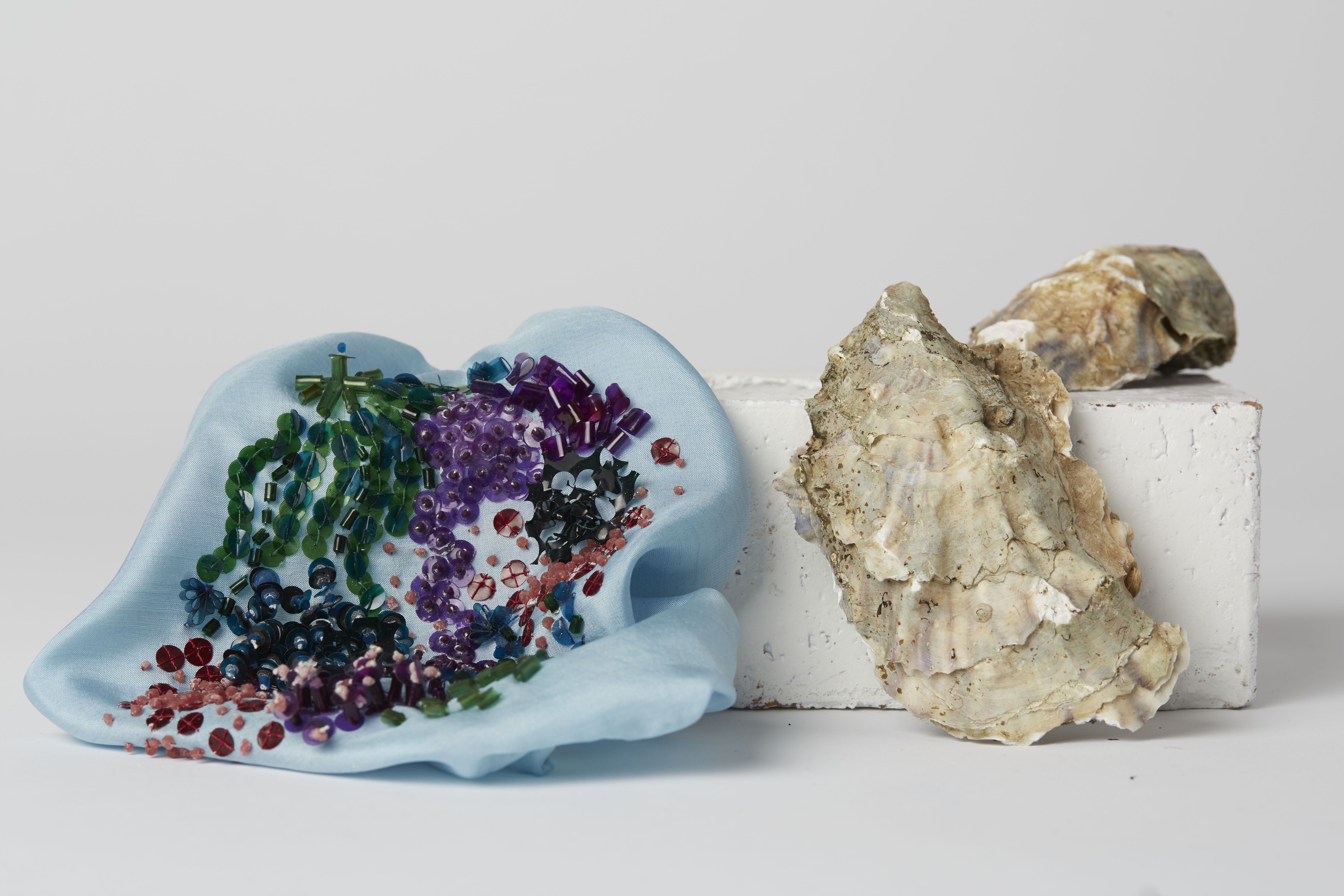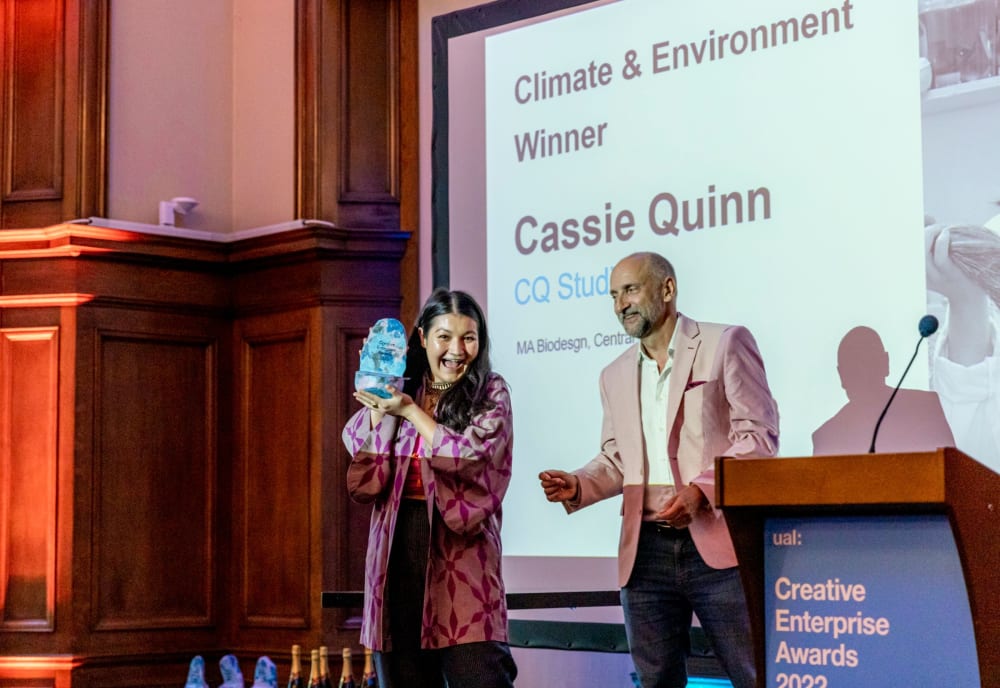
Meet: Cassie Quinn

- Written byEleanor Harvey
- Published date 26 July 2022

Cassie Quinn’s innovative research and development studio, CQ Studio combines science, craft and fashion. The studio grew out of her final projects during her MA in Biodesign at Central Saint Martins (CSM) in 2021. These included developing biodegradable sequins and regenerative materials using flax seed.
CQ Studio recently won 2 awards for research into regenerative materials:
- Mayor’s Entrepreneur Awards – Creative Industries: each winner receives £20k to start up their business along with expert mentoring from staff at City Hall to get their idea to market. The Creative Industries award looks for innovations to make the creative industries more sustainable.
- UAL Creative Enterprise Award – Climate & Environment: these awards are run in partnership with industry leaders and organisations. Prizes for winners include £5,000, an award trophy, showcasing opportunities, leading industry mentorship and specialist business advice.
The awards will allow Cassie to scale up her work, as well as provide mentoring opportunities. We spoke to Cassie to find out more.

Firstly, congratulations on winning both the Mayor’s Entrepreneur Awards – Creative Industries, and the UAL Creative Enterprise Award – Climate & Environment. How did it feel when they announced you’d won?
Thank you so much! I honestly was really shocked each time when I was announced, seeing the other finalists at both awards it was clear it was a tough competition and there are so many incredible entrepreneurs. It did feel like a real journey though as it was the third year applying for both competitions, each time I made it a little further and learned a lot through all the support workshops and also from speaking to previous winners. Overall though I felt so excited and happy to have won as I have so many plans for my business, the support from these awards will help me turn ideas into reality, I couldn’t be more grateful.

How will these awards support your research?
These awards will allow me to purchase new equipment and machinery to test how I can scale the manufacturing processes. Importantly they will give me access to important professional mentoring to help me develop an ambitious business strategy to take my products from prototyping to market. The team also supports me with networking opportunities and advice beyond the awards. Additionally, winning both awards has allowed me to grow confidence in my position in my industry.

You graduated from CSM's MA Biodesign course in 2021. How did you come to choose that course?
I was on a design residency with Brooke Roberts Innovation Agency where I started to experiment and research innovative textiles when Brooke mentioned that I might be a suitable candidate for a new MA launching at CSM. I went to the open day and was blown away that this course existed and knew I wanted to take it on. It’s quite funny that I never imagined I would study at Master’s level and not only have I done that, but I’m also starting my PhD in September!
Have you always had an interest in how the fashion industry impacts the climate?
I first started to think about the fashion industry and climate when I was in the second year of my undergrad, we had a module called ‘Fast Fashion’ and we had to design collections for this industry, I thought - this doesn’t feel right and so I created something completely the opposite for my Conceptual Design module. It was called ‘Fossiliastic’ and was looking at the potentially devasting future where we are all fossilised in our own plastic waste, but ironically I used plastic to produce the collection and that’s really when I started to investigate natural fibres, innovative textiles and the world of biodesign.

CQ Studio grew out of your MA research projects Excessories, a collaboration with LVMH/Maison0; and Inflaxuation, your final project looking into regeneratively grown flax as a source for textiles. Can you tell us more about this?
Both of my Master’s projects were about showing that we can add more value when we use sustainable practices, this thought process is what led me to want to turn them into a business, as I could see the potential to make a difference.
My final project sought to push the potential of the flax plant that’s been grown in a crop rotation, to demonstrate that by using regenerative practices you can increase the value of flax, whilst producing innovative fabrics. The reason I wanted to focus on flax is that it was once a thriving industry in Ireland (where I am from). Cultivation has declined since the 1950s and I wanted to show that we can reintroduce the plant whilst supporting sustainable production.

Are regenerative materials key to the future of fashion?
Yes, I believe it’s the only way we can move forward and as designers, it's down to us to demand change by demonstrating the possibilities whilst working in a regenerative manner. Already, the industry is becoming aware of the need for this and just recently I finished some work on the design team as Senior Designer for the Maison0 Rewilding Textiles project which was supported by LVMH for the 10th Future Fabrics Expo. During this project, I was able to continue developing some bespoke Detox Sequins using the wastewater from the dyeing processes of algae and bacteria, which were then used in the collection.

Alongside your research, you also run workshops to educate customers on regenerative materials. Why are these important?
Workshops are important for me for multiple reasons, it allows me to make income whilst I am still at the research and development stage and it helps to spread the message about what these materials are and why we need to rethink our fashion choices. I see the workshops as the small-scale, on-the-ground impact and the material development as the larger-scale industry impact. By considering both I feel as though I am doing as much as I can to help create positive change in the fashion industry.
More
Explore more of Cassie's research: cqstudio.uk
Follow CQ Studio on Instagram: @c.q.studio
Find out more about the UAL Creative Enterprise Awards
See all the winners of the UAL Creative Enterprise Awards 2022